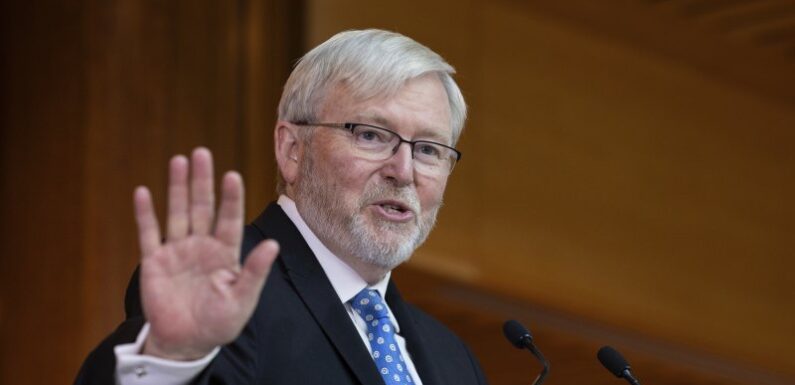
Save articles for later
Add articles to your saved list and come back to them any time.
Australia will establish the military equivalent of a free trade zone with the United States and United Kingdom under sweeping changes to the nation’s defence export laws that will also make it illegal to share sensitive technology with foreigners in Australia.
The proposed changes to Australia’s defence trade control regulations, quietly released for public consultation last week, are designed to allow the sharing of sensitive technology under the AUKUS pact while protecting these secrets from being stolen by nations such as China and Russia.
Australian ambassador to the US and former prime minister Kevin Rudd said collaboration between western and Chinese researchers was becoming increasingly difficult. Credit: Alex Ellinghausen
Former prime minister Kevin Rudd, now Australia’s ambassador to Washington, on Monday warned that “normal scientific collaboration” between Western researchers and their Chinese counterparts will become increasingly difficult as the US and China compete for global dominance.
The government’s explanatory memorandum for the bill says: “This export licence-free environment will revolutionise trade among and between AUKUS partners and encourage industry, higher education and research sectors in all three nations to innovate and co-operate with lower technology transfer barriers and costs of trade”.
“This would provide Australia and our partners a genuine capability development edge… Realising the full potential of AUKUS will not be possible without major changes to the way that AUKUS partners co-operate on defence industrial and technology issues.”
While welcoming the relaxation of export rules with Australia’s AUKUS partners, universities and scientific research organisations fear the creation of strict new penalties for unauthorised technology sharing will stifle collaboration with researchers who are not from the US or UK.
The legislation would provide an exemption to the UK and the US from Australia’s export control permit requirements while creating three new criminal offences punishable by up to 10 years in jail.
These new offences include supplying a prescribed technology from the government’s defence and strategic goods list – which covers an array of goods ranging from nuclear material to advanced computers – to a foreign person within Australia who is not British or American.
Chennupati Jagadish, the president of the Australian Academy of Science, said the organisation welcomed a more “seamless collaborative environment” with the US and UK, but said he was “concerned about the negative impacts this will have on research collaborations with all other countries, which serve our national interest”.
“The very architecture and nature of Australia’s capacity to engage in the global research system is at stake with the enactment of the proposed Defence Trade Control Amendment Bill,” he said.
“This legislation will see Australia expand its backyard to include the US and the UK but raise the fence for any other country when it comes to international research collaborations.”
Peter Dean, director of foreign policy and defence at the United States Studies Centre, said it was notable that the government had introduced the bill almost immediately after Prime Minister Anthony Albanese’s trip to Washington.
This indicates the government is confident the US Congress will approve major changes to its own export control laws, he said.
In a discussion aired on Monday night in Canberra at a conference organised by the Australian Academy of Science, Rudd said: “You can conceive the possibility of, here in the United States, of a range of academic institutions in certain research domains or across most research domains from being prescribed from engaging effectively with their Chinese counterparts.”
While collaboration on medical research and the life sciences would likely continue, he said that “if you are at the hard edge of the sciences which are nearest and closest to the revolutionary intersections involving artificial intelligence … it’s going to be harder and harder as both sides seek to de-risk their engagements for what we would describe as normal scientific collaboration to occur”.
Vicki Thomson, the chief executive of the Group of Eight universities, said the organisation was “working with government on appropriate exemptions to ensure that there are no unintended consequences as a result of any changes”.
“Our suggested approach is to ring-fence AUKUS research so that we put tall fences around small paddocks and protect that which must be protected but not at the expense of broader research collaboration,” she said.
Defence Minister Richard Marles’ office did not respond to a request for comment.
Cut through the noise of federal politics with news, views and expert analysis from Jacqueline Maley. Subscribers can sign up to our weekly Inside Politics newsletter here.
Most Viewed in Politics
From our partners
Source: Read Full Article
